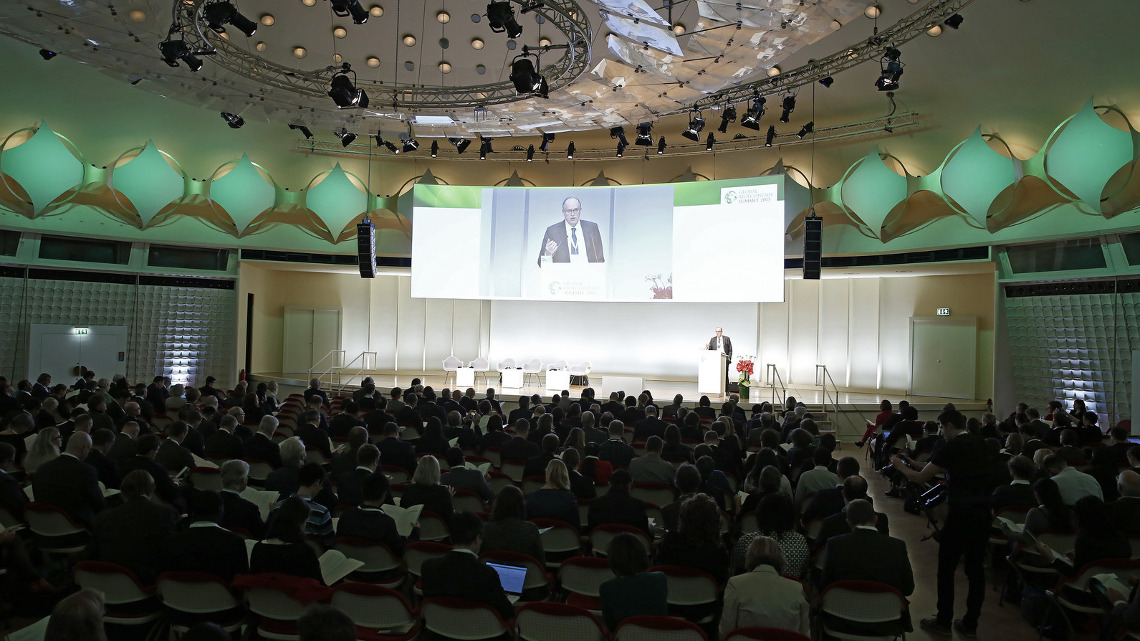Global Bioeconomy Summit in Berlin
800 international experts will participate in the 2nd GBS in Berlin next week. Representatives from politics, science, and the business sector will discuss the future of bioeconomy.

For the second time, the German Bioeconomy Council, with the financial support of the Federal Ministry of Education and Research (BMBF), has invited experts on bioeconomy, innovation, and sustainability from all over the world to Berlin. The Council has been established as an independent advisory board to the Federal Government in 2009. During the Summit, which will take place on April 19 and 20, the focus will be on opportunities and challenges for an increasingly biobased and sustainable economy.
More than 100 top-class speakers
H.E. Anja Karliczek, the Federal Minister of Education and Research, will open the Global Bioeconomy Summit 2018 at the Telekom-Forum (HSR) on 19 April.
More than 100 top-class speakers will join the event, among them ministers and government representatives from Asia, Africa, Europe, South and North America, international policy experts from the United Nations, the Organisation for Economic Co-operation and Development (OECD) and the European Commission, as well as high-level representatives of science and industry.
Broad platform for a bright future
In six plenary sessions and 14 workshops, the conference offers a broad platform for discussing the current societal and political challenges from a bioeconomy point of view. The focus will be on the following questions:
- How can the protection of biodiversity and nature become compatible with the economic use of biological resources?
- What role can bioeconomy play in finding new solutions to global challenges such as climate change, food security, health and increasing environmental pollution?
- Which biobased innovations and technical solutions are currently being developed in the industrialized and developing countries, in the northern and southern hemispheres?
- Which political framework conditions are necessary to accelerate change
- towards resource-friendly industrial production?
- How can such a substantial economic transformation away from fossil resources and towards the use of biological resources be financed?
- What do investors expect from startups and established companies and where should public funding step in?
- How can the innovation potential of young scientists, founders and high-tech companies be leveraged?
International policy exchange across the field of bioeconomy
“The creation of a sustainable, biobased economy is more urgent than ever, considering the growing environmental and climate problems. The great response to the summit is a clear sign that we need a global policy exchange, beyond national policy and research strategies,” says Joachim von Braun, co-chair of the German Bioeconomy Council, pointing out: “With this conference, we are creating an unparalleled global forum where key players of the bioeconomy can discuss future political actions, exchange best practices and learn from each other.” At the same time, the summit provides an opportunity to review the progress made since the first Summit in 2015.
Overview of global political bioeconomy activities
On the first day, the German Bioeconomy Council will present its new study, which provides an overview of political bioeconomy activities worldwide. Around 50 countries have integrated the bioeconomy in their strategies to date.
On the second day, the results of an expert survey on expectations and future visions for the bioeconomy will be published. This survey was commissioned by the German Bioeconomy Council and received contributions from 350 international bioeconomy experts. The 40 members of the International Advisory Council of the summit will also present key policy recommendations in a Communiqué.
Bioeconomy products in the exhibition –Bioeconomy World Exhibition
A world exhibition of bioeconomy products will illustrate how current products can contribute to the global sustainability goals. Around 50 innovative bioeconomy products from more than 25 countries will be presented and show that we already have products which are manufactured using biobased processes or which are based on renewable resources. “Thanks to the rapid progress in the life sciences, an increasing number of biological processes have been established and organic residues can now be upgraded to valuable materials. Industry sectors such as the chemical, construction, textile and food industries benefit from these developments. The innovation potential is far from exhausted and digitization will contribute to an acceleration of bio-innovation,” says Christine Lang, co-chair of the German Bioeconomy Council. Against this background, the summit provides insights into current research initiatives and focuses on questions such as: How do financial investors evaluate the sector? What kind of framework conditions do companies need to get bioeconomy products and services to the consumer? How do we create synergies from the interaction between low-tech and high-tech in a global bioeconomy?
Global bioeconomy summit is happening for the second time
The Global Bioeconomy Summit has been organized in Berlin for the second time. In November 2015, the bioeconomy community met for the first GBS and agreed in a Communiqué to better anchor the bioeconomy in international policy and to pursue it as a strategy for achieving climate protection and the Sustainable Development Goals.


